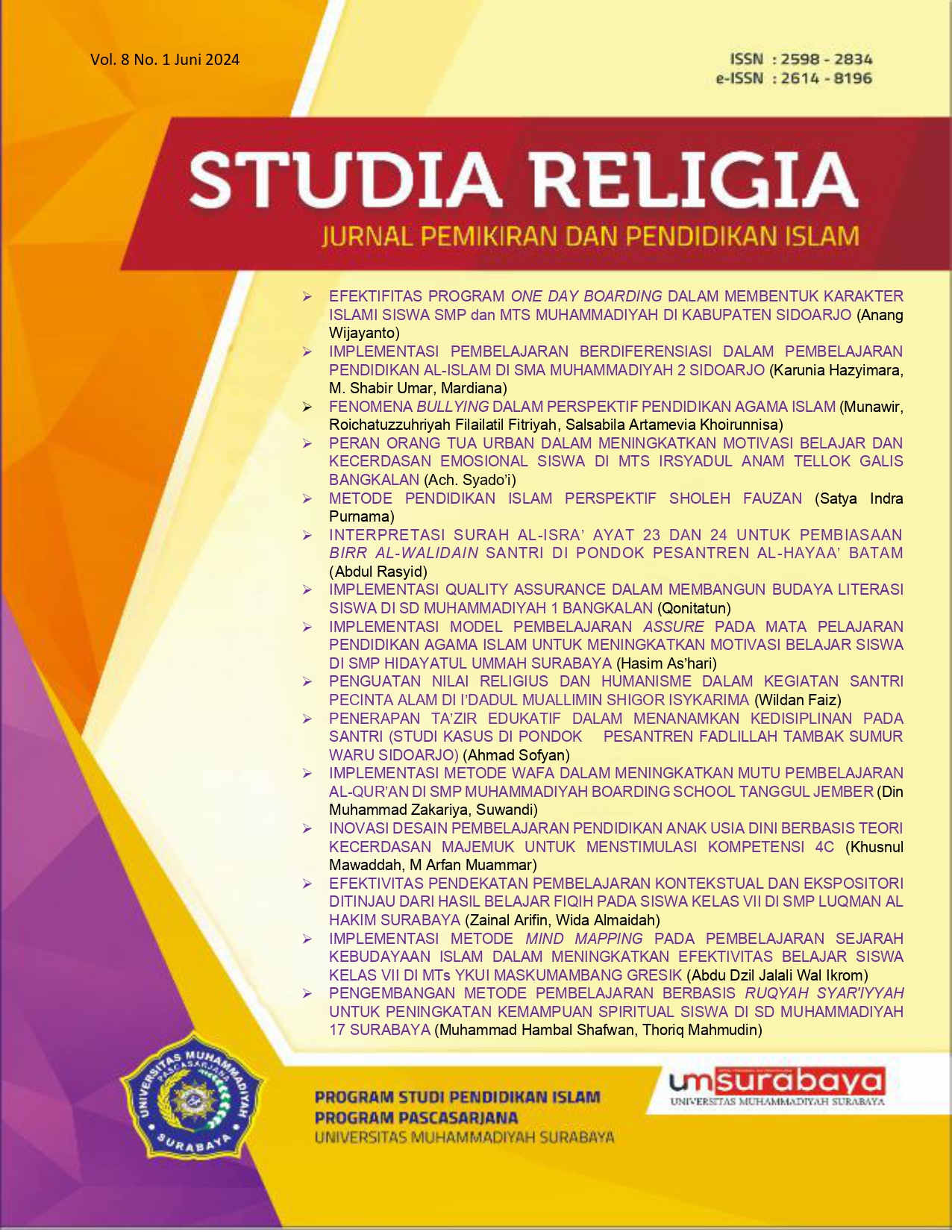METODE PENDIDIKAN ISLAM PERSPEKTIF SHOLEH FAUZAN (TELAAH KITAB SYARAH HADIS JIBRIL)
DOI:
https://doi.org/10.30651/sr.v8i1.22484Abstract
This research discusses: 1. How is the study of Sholeh Fauzan's Syarah Hadith book of Jibril?, 2. What is the method of Islamic education from Sholeh Fauzan's perspective in Jibril's Syarah Hadith?, and 3. What is the relevance of Islamic education in Sholeh Fauzan's perspective on education in Indonesia ?. In this study the authors used a qualitative research method with a literature study approach, where the authors used some literature in the form of books, articles, or the like, both online and offline, which became the source of data in this study. The data sources in this study were divided into two, namely primary data sources, namely the book of Gabriel Hadith Syarah and secondary data sources, namely several books, articles or others that have links with the discussion being studied. After conducting research on the book of Jibril's Syarah Hadith using the qualitative method, several research results were found including: 1. The contents of the Jibril's Syarah Hadith include (Islamic Education Methods, Islamic Education Materials, Islamic education curriculum, and Aqidah and morals). 2. Methods of Islamic Education, including (Question and Answer Method and Exemplary Method). 3. The Relevance of Islamic Education in Sholeh Fauzan's Perspective in Indonesia, including (Islamic Education in Indonesia, Methods of Islamic Education in Indonesia, Education Curriculum in Indonesia) the conclusion that these three findings are very relevant when applied to Islamic education in Indonesia.
References
Anwar, Heru Saiful. “Membangun Karakter Bangsa.” At-Ta’dib 8, no. 1 (2013): 4–10. https://ejournal.unida.gontor.ac.id/index.php/tadib/article/view/511.
Ardiansyah, Muhammad. Konsep Adab Syed Muhammad Naquib Al-Attas. Depok: Yayasan Pendidikan Islam At-Taqwa, 2020.
Moeleong, Lexy. Metodologi Penelitian Kualitatif. Bandung: Remaja Rosdakarya, 2002.
Sari, Bitari Widia, and Dedih Surana. “Model Pembelajaran Integratif Untuk Mata Pelajaran Pendidikan Agama Islam Di Masa Pandemi Covid-19.” Jurnal Riset Pendidikan Agama Islam 2, no. 1 (2022).
Shafwan, M. H., & Baihaqi, I. “STRATEGI INTERNALISASI NILAI IMAN KEPADA ALLAH DI KELAS QONUNI 3 DAN 4 DI KUTTAB AL-FATIH SIDOARJO.” Jurnal Penelitian dan Pendidikan Agama Islam Karang Asem 5, no. 2 (2022): 53–59.
Shafwan, Muhammad Hambal. “HADITH EDUCATION IN FORMING CHARACTER OF EARLY CHILDHOOD.” Studia religia 4, no. 1 (n.d.): 01–11. https://core.ac.uk/download/pdf/327263797.pdf.
———. “KONSEP AL-QUR’AN TENTANG KECERDASAN EMOSIONAL DAN IMPLIKASINYA DALAM PENDIDIKAN ISLAM.” STAIKA 04, no. 02 (2021): 128–141. http://jurnal.staim-paciran.ac.id/index.php/staika/article/view/45.
———. “PENDIDIKAN TAUHID DAN URGENSINYA BAGI KEHIDUAPAN MUSLIM.” Tadarus 09, no. 01 (2020): 47–58. http://journal.um-surabaya.ac.id/index.php/Tadarus/article/view/5462.
Sugiyono. Metode Penelitian Kuantitatif, Kualitatif, Dan R&D. Bandung: Alfabeta, 2010.
Tolchah, Moch. “Studi Perbandingan Pendidikan Akhlak Perspektif Al-Ghazāli Dan Al-Attas.” EL-BANAT: Jurnal Pemikiran dan Pendidikan Islam 9, no. 1 (2019): 79–106.
Downloads
Published
Issue
Section
License
Copyright (c) 2024 Ahmad Suhri, Satya Indra Purnama

This work is licensed under a Creative Commons Attribution-NonCommercial 4.0 International License.
Penulis tetap memegang hak atas karyanya dan memberikan hak publikasi pertama kepada jurnal ini yang secara simultan karya tersebut dilisensikan di bawah:
Creative Commons Attribution-NonCommercial 4.0 International License









